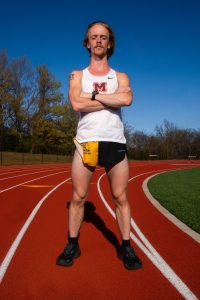Bell Buckle native lands life-changing internship

Submitted photo
Editor’s note: The following news feature contains references and discussion of suicide and suicidal ideation.
If trophies were given to Maryville College students who embody the idea of doing “good on the largest possible scale,” sophomore Steve Cope ’26 might win by unanimous consent.
The Bell Buckle, Tenn., native wasn’t inspired to such lofty life goals by the Rev. Isaac Anderson, Maryville College’s founder and the source of that particular creed: Rather, he went looking for an institution of higher education that reflected what he felt in his heart as a young man casting about for a future, and he found it in MC.
“When I visited Maryville College for the first time, I came here and said, ‘This feels like a place I could call home,’” Cope says. “That was the selling point for me. It wasn’t anything really numerical, no physical quantity or quality — just a feeling that I can set my roots down and call this place home, and it’s gone so much better than I expected. I almost went to another school, and nothing against it, but I don’t think I would even remotely be the same person that I am today. Maryville College is such a fertile ground for exploring the world and exploring yourself, and it’s much more fertile than I realized.”
Planting seeds of activism
Such rich soil of the mind and soul are only as good as the individual who plants seeds there, however, and Cope — a double major in Philosophy and Psychology (Counseling track) who is already exploring a joint doctoral program in both studies at Yale University after he graduates in 2026 — has taken every advantage of sowing them that MC has offered. As a second-year student, he’s already interning with the Tennessee Suicide Prevention Network (TSPN), and was on hand last September to accept a proclamation from the Blount County Commission acknowledging Suicide Prevention Awareness Month.
Cope’s passion for helping others dates back to a time of self-discovery brought on by the COVID-19 pandemic, he says. Growing up on a small family farm, he grew up as a self-determined kid who found the world through podcasts and audiobooks he would listen to while distance running, he says.
“As much as I had a very rural upbringing, I had a chance to do a lot of self-discovery on my own. The frontier of my world was not very crowded, per se, and in that open frontier, mostly metaphorically, I devoted myself to things I could enjoy and that would challenge me to prove my character,” he says. “Before COVID hit, I sort of lived in this self-determined American bliss, and I was a pretty prototypical guy who went out and did the usual fun stuff, but then COVID happened, and I’m by myself, and I was trapped with my own thoughts. At that point, I started questioning the way I lived, and what I had been taught to believe growing up.”
Rather than rejecting those teachings, however, he embraced the pursuit of knowledge to dissect, defend and embrace them. During his runs, he began listening to speakers and theologians who espoused Christian apologetics — the systematic discourse that defends Christianity through reason and evidence — and went through a period of spiritual evolution, he said, that led him to larger conversations about psychology and society. What he sought, he began to realize, was truth.
“That’s what I value. That’s what’s really important to me,” he says. “As (German philosopher Arthur) Schopenhauer said, ‘Life is short and truth works far and lives long: let us speak the truth.’ To the best of my ability, I try to really do that, and in doing that, I wanted to seek an environment that would foster that search. I wanted to find a place that really doesn’t take things for granted, that allows you to question everything, that encourages you to search out the big, heavy-duty questions.”
Tending to fields of the mind
At Maryville College, he adds, he found that place, and more. During his first year in the fall of 2022, he picked up Elementary Italian, taught by adjunct instructor Ted Higgs. It was a last-minute addition to his course load, one of the few classes that fit his schedule, he says, but Higgs saw something in Cope and encouraged him to apply to Maryville College’s Bonner Scholars Program.
“He told me, ‘There’s this scholarship you should check out,’ so I applied, and because it’s a community service-based scholarship, my idea was to work in suicide prevention somehow, and I ended up getting it,” he says.
It’s an intimately personal cause for Cope, one born of friendships that ended in the suicide of those he cared about, and the awkward misunderstanding of it prevalent in so many communities that err on the side of stigma rather than conversation. Such reactions made him determined to make a difference, and he began working in suicide prevention even before he graduated high school.
“I worked for Access Hope, a suicide prevention and care call hotline (in Middle Tennessee), and after I graduated high school, I worked at Brooks Healing Center, an addiction treatment program (in Normandy, Tennessee),” he says. “In working at both, I saw the various issues that lead people to tragically believe that a voluntary death is the only way out. I experienced suicide loss multiple times when I was growing up and in high school, specifically, the way it was handled, generally speaking, was not very good at all.
“It was almost detrimental to the lives of those who survived, and as someone who experienced it firsthand multiple times, I saw this, and from that, I vowed to devote my life so that nobody else would have to go through what I had to go through.”
At Maryville College, working in suicide prevention is a natural companion to his double major. Understanding it psychologically is necessary, Cope says, but approaching it philosophically is a way to overcome misconceptions about suicide as well.
“Suicidality is psychological, but it’s also deeply philosophical, in the sense that you’re on an existential cliff’s edge, and whether or not you realize it, the meaning behind life is whether or not you fall off that cliff voluntarily,” he says.
Reaping the rewards of selfless service
Through the Bonner program, he landed an internship with TSPN, working with Dr. Emily Hager, the organization’s East Tennessee regional director. He gathers demographic data for her presentations to community groups and organizations that include statistics on suicide as well as those of adjacent issues that are associated with it — gun violence, homelessness and drug abuse. He maintains a calendar of meetings of regional government bodies, and he edits guidelines and offers updates to TSPN’s planning suggestions for actions school administrators can take after the suicide of a student.
“I helped design a card that includes 10 or 12 different affirmations for survivors of suicide loss,” he says. “Working with TSPN feels like I’m making a difference in a way that isn’t this broad arm swath of trying to fix something. It feels like I’m able to help people directly. I don’t just want to be a person who reads how to do something in a book and then goes and tells other people how it should be done.
“Nothing against a purely academic approach, of course, but Maryville College has allowed me to find a different sort of application through which I can follow the path I want and realize my dream. I’m still open to what that is, but I see problems with how suicide prevention and suicidology are approached in this country, and I see systemic problems that lead to increased hurt, loneliness and anger, and I want to be a part of fixing some of those problems. I want to devote my life to making the world better for those struggling with self-harm, with suicidality, and with the loss of a loved one.”
It’s a bold vision, one born of ambition and determination, and at any other institution, it might be met with skepticism. At Maryville College, however, he’s found a springboard for those plans, and the faculty members guiding him along the way are as invested in helping him find ways to do good on the largest possible scale as he is.
“Steve is the quintessential liberal arts student, a lover of learning about all things,” says Dr. Crystal Colter, professor of psychology and chair of the Division of Behavioral Sciences at MC. “I am inspired by his passion for applying all that he is learning in psychology and philosophy toward the goal of understanding and preventing suicide. In addition, he is developing his professional skills both in the classroom and through a wonderful internship experience. I’m so honored that I and MC get to be part of his professional and personal journey. He is well on his way to doing good on the largest possible scale, and I can’t wait to see where the future takes him!”
“Steve is an outstanding young man on so many fronts — intellectually, pre-professionally and personally,” adds Dr. William Meyer, professor of philosophy and the Ralph W. Beeson professor of religion at Maryville College. “Having served as his first-year advisor last year and now as his co-advisor as a Philosophy-Psychology double-major, I’ve had the pleasure of getting to know Steve quite well over the past year and a half.
“Academically, he is superb; personally, he is caring and conversant; and pre-professionally he is focused and dedicated. He is already exploring a joint-doctoral program at Yale specifically in philosophy and psychology, which will further equip him to make a significant contribution in the area of suicide prevention. In sum, Steve Cope is a man of unseasonable wisdom and maturity for such a young age —dedicated to seeking truth, serving community, and caring for others. Isaac Anderson would be very proud!”
While another institution may have provided similar paths toward his calling, Maryville College has undoubtedly been a place of radical transformation, according to Cope. As an individual who sought ways to do good before coming to the College, finding a school where the founder’s credo mirrors his internal ideology has been intellectually and personally rewarding beyond measure.
“Maryville College is a place I can leave and say, ‘I was made a better person. I’m more fit for my goals because of it,’” he says. “The most important point of it has been the academic rigor, but the ability to focus on a thesis, to work with high-quality professors, to take these amazing subjects … I’m getting into the ring every day, and my brain is going to the gym, as Dr. Meyer says. I’m talking with people who have different and diverse ideas, and I know that when I come out of here, I’ll be weathered and ready to be a part of the solution.”
This press release was provided by Steve Wildsmith, Assistant Director of Marketing & Communications, 502 E. Lamar Alexander Parkway, Maryville, Tenn.





![For-Tips-and-Ideas-Phone-300x250-Bedford-County-Post[1]](https://www.bedfordcountypost.com/wp-content/uploads/2023/09/For-Tips-and-Ideas-Phone-300x250-Bedford-County-Post1-300x250.jpg)
![Subscribe-Now-300x250-Bedford-County-Post[1]](https://www.bedfordcountypost.com/wp-content/uploads/2023/09/Subscribe-Now-300x250-Bedford-County-Post1-300x250.jpg)
